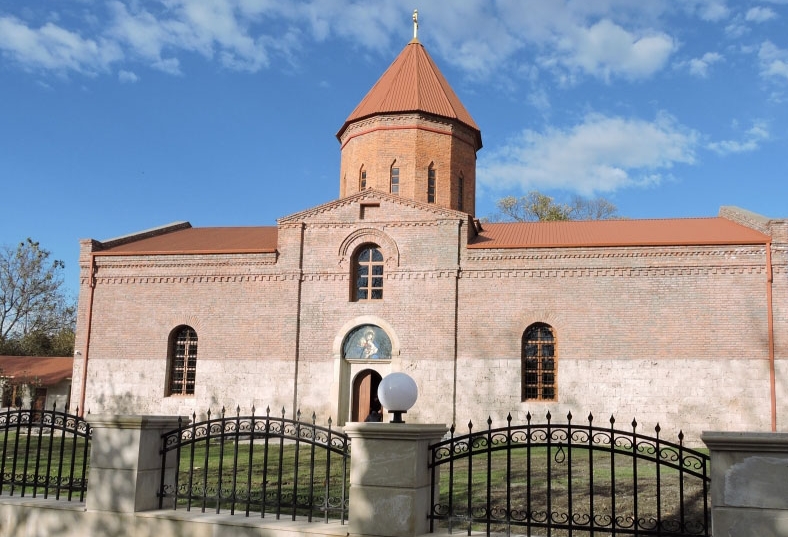



Nij village - home to ancient Udi people, Orthodox Christian community in Azerbaijan’s Gabala district

Baku, February 14, AZERTAC
Azerbaijan is a country populated by many ethnicities, which is an evidence of tolerant environment and harmony that has existed here for centuries.
Azerbaijan has already become one of the centers of multiculturalism in the world, and this status is already recognized by the world community.
It is no coincidence that by President Ilham Aliyev’s Order 2016 was declared the year of Multiculturalism in Azerbaijan.
Having declared 2016 a Year of Multiculturalism, Azerbaijan, first of all, the country wanted to show that multiculturalism here is both a state policy and a way of life.
With a population of over 10 million people, Azerbaijan is home to 20 ethnic minorities, which have preserved their language, material and spiritual culture.
Udis, the Orthodox Christian community in the village of Nij, Azerbaijan`s Gabala district, are one of 26 local Alban tribes that established the Alban state (3rd century BC – 8th century AD).
Their central region is Karabakh – the area between the Kura and Aras rivers. There are 6,000 Udis living predominantly in the Nij village, which is mentioned by ancient Greek authors.
The largest number of Udi people reside in the village of Nij, Gabala district. This original village, in which a large number of ancient monuments have survived, is of great value for all who are interested in ethnotourism.
Located just over 20 kilometres south-west of Gabala, the village of Nij is home to the largest population of Udi people anywhere in the world.
Udis, Christian people directly descended from one of the main tribes living in Caucasian Albania, in fact, still speak an endangered language that is essentially the same as that of the ancient Albanians.
There are three churches and two mosques in Nij, which is home to 3,700 Udis.
Visitors can explore the history and culture of this warm community by visiting the beautifully restored 17th-century Albanian church (Chotari Church) which sits shaded by magnificent plane trees not far from the village centre.
Every year, Udis, celebrate Christmas in this ancient Church.
The renovation of the Cotari church in the village of Nij is a beautiful illustration of tolerance in Azerbaijan.
The Udi people have never encountered any discrimination or intolerance as other representatives of different nationalities and cultures who have always lived in peace and as one family in Azerbaijan.
While visiting the Gabala district on May 16, 2021, President of the Republic of Azerbaijan Ilham Aliyev, First Lady Mehriban Aliyeva and their daughter Leyla Aliyeva also familiarized themselves with the restoration work done in the Albanian Church of the Blessed Virgin Mary located in Nij settlement of Gabala district.
The restoration of the Church of the Blessed Virgin Mary was started by the Heydar Aliyev Foundation in 2019 and completed during the 44-day war in November 2020.
President Ilham Aliyev once again confirmed Azerbaijan’s strong commitment to preserve its rich historic and cultural heritage saying: “The Udi people have a great historical heritage. You are performing divine services both in the territory of Gabala district and, at the same time, on liberated lands – both in Khudavang and Aghoghlan. There are also other temples belonging to the Udi people there. Most of them are either in a ruined or dilapidated condition. Therefore, we will restore them too. You will be able to visit those churches too. You have been to Khudavang several times.”
As the Ministry of Culture of Azerbaijan has repeatedly stated, along with mosques and other Islamic monuments in the liberated territories, the Christian heritage, irrespective of its origin will also be preserved, restored and put into operation at the highest level.
Finally, all the above-mentioned factors reaffirm the fact that the restoration and reconstruction of Azerbaijan’s historical and religious monuments, including churches and synagogues, is an integral part of the policy pursued by the Azerbaijani state in this area.
"MasterChef Türkiye" dedicates next edition of its famous TV program to Azerbaijan
Egypt’s first underwater military museum to be established in the Red Sea
Azerbaijan, India mull prospects for tourism cooperation
Azerbaijan`s ornithological tourism opportunities presented in Global Bird Fair in UK
Azerbaijan presents its cuisine at National Geographic Traveller Food Festival 2023